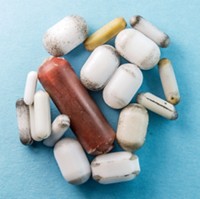Advertisement
Grab your lab coat. Let's get started
Welcome!
Welcome!
Create an account below to get 6 C&EN articles per month, receive newsletters and more - all free.
It seems this is your first time logging in online. Please enter the following information to continue.
As an ACS member you automatically get access to this site. All we need is few more details to create your reading experience.
Not you? Sign in with a different account.
Not you? Sign in with a different account.
ERROR 1
ERROR 1
ERROR 2
ERROR 2
ERROR 2
ERROR 2
ERROR 2
Password and Confirm password must match.
If you have an ACS member number, please enter it here so we can link this account to your membership. (optional)
ERROR 2
ACS values your privacy. By submitting your information, you are gaining access to C&EN and subscribing to our weekly newsletter. We use the information you provide to make your reading experience better, and we will never sell your data to third party members.
Education
Newscripts
Golden Years
by Bethany Halford
October 13, 2008
| A version of this story appeared in
Volume 86, Issue 41

While a GOLDEN WEDDING RING may be the most visible symbol of the everlasting bond between you and your spouse, the romantics here at Newscripts were saddened to learn that the jewelry itself is anything but eternal. Even the nuptial act of slipping the gold band on your beloved's finger is just the first of countless abrasive maneuvers that will slowly erode the ring and leave minute traces of gold wherever you go. It's even been found in laundry dryer lint.
Georg Steinhauser, a chemistry postdoc at Austria's Vienna University of Technology, decided to quantify his wedding band's weight loss during his first year of marriage. He recently published the results of the study in a paper dedicated to his wife, Veronika, on their first wedding anniversary (Gold Bull. 2008, 41, 51).

Each week—usually on Thursday—Steinhauser meticulously cleaned and weighed his wedding ring using an ultrasonic bath and a microanalytical balance. When he started, a week after his wedding day, the 18-carat yellow gold ring weighed 5.58387 g. A year later, the ring had lost 6.15 mg, with an average weekly decline of 0.12 mg.
A vacation on the sandy beaches of Malta led to the highest weekly weight loss (0.23 mg), with gardening coming in a close second (0.22 mg). Steinhauser noted that hand clapping while attending a rock concert also led to an above-average abrasion (0.17 mg), as did skiing (0.20 mg). Spending two days in bed with the flu seemed to have no influence on the ring's weight loss, nor did a short trip to Spain, despite having to carry a heavy suitcase.
What was Mrs. Steinhauser's reaction to the ring research? "She is a psychologist and does not always share my enthusiasm about chemistry and science," Steinhauser says. "But she shared my happiness about every single weighing result when I came home and told her about the last week's result. Sometimes she reminded me on Thursdays to not forget to weigh the ring."
From the Department of Obscure Information:
- December is the most popular month for engagements.
- Americans will spend more than $6 billion on engagement rings this year along with another $2 billion for wedding rings for the bride and groom.
- The average wedding budget in the U.S. is $27,882, not including honeymoon costs.
- With an average of 189 invitees, Wisconsin couples have the largest weddings. The national average is 153 guests.
Steinhauser is continuing the research, although he now weighs the ring just every six months. "The plan is to publish this long-term study as the 'work of my married lifetime' at the end of my scientific career," he says. "Divorce is out of the question!"
And while no love may be lost from wedding-band wear and tear, there is a financial loss. "In Vienna, a city of some 1.7 million inhabitants, there are approximately 307,000 married couples," Steinhauser points out. "Assuming that approximately 60% of them wear a wedding ring (made of 18-carat gold) regularly, the abrasion of 368,400 wedding rings would cause the annual total loss of 2.2 kg of 18-carat gold." That adds up to about $59,400 of lost gold dust in Vienna alone. Following that same logic, the 55.2 million married couples in the U.S. lose about 407 kg of gold each year at an annual cost of almost $11 million.
There was also a more chemically relevant lesson from Steinhauser's study: To avoid contamination, scientists should remove any gold rings before entering analytical laboratories dedicated to the analysis of trace metals. For the same reason, the winners of this year's Nobel Prizes might also want to refrain from wearing their shiny new gold medals in the lab.
Bethany Halford wrote this week's column. Please send comments and suggestions to newscripts@acs.org.







Join the conversation
Contact the reporter
Submit a Letter to the Editor for publication
Engage with us on Twitter